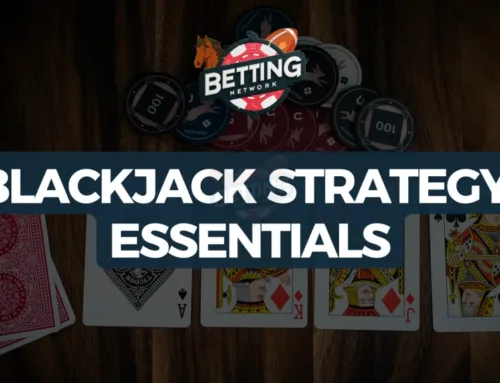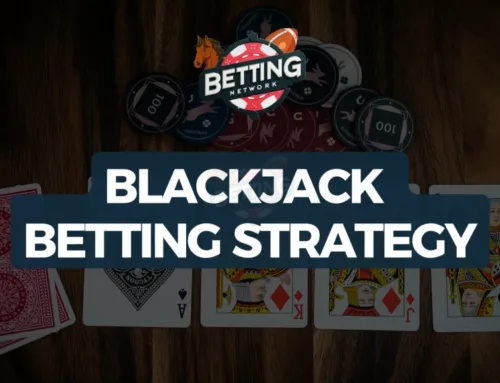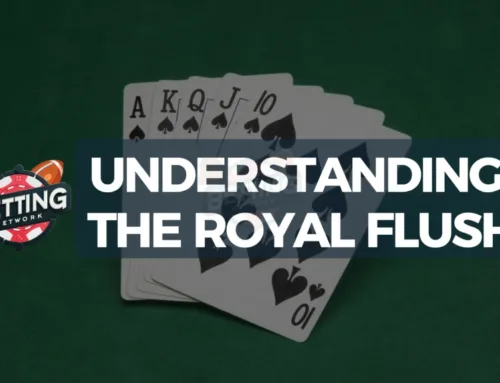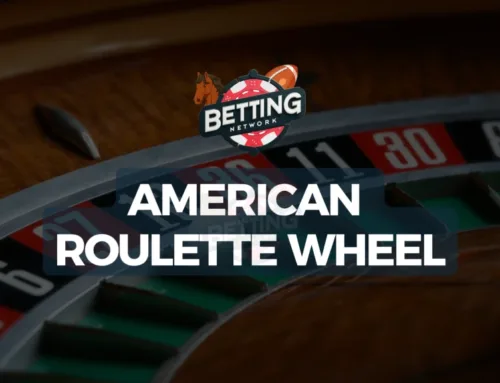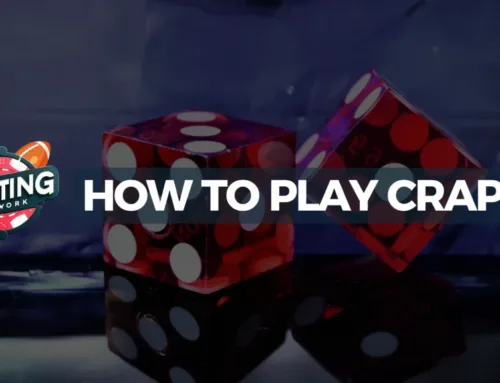Blackjack is a deceptively simple game. In fact, most beginners and just think of it as a game of chance, reserved for those blessed with tremendous luck. They’re unaware of the layers of strategy, skills and lightning-speed calculations that veterans use to succeed and thrive in both real life and online casinos.
One of these skills is knowing when to split in Blackjack.
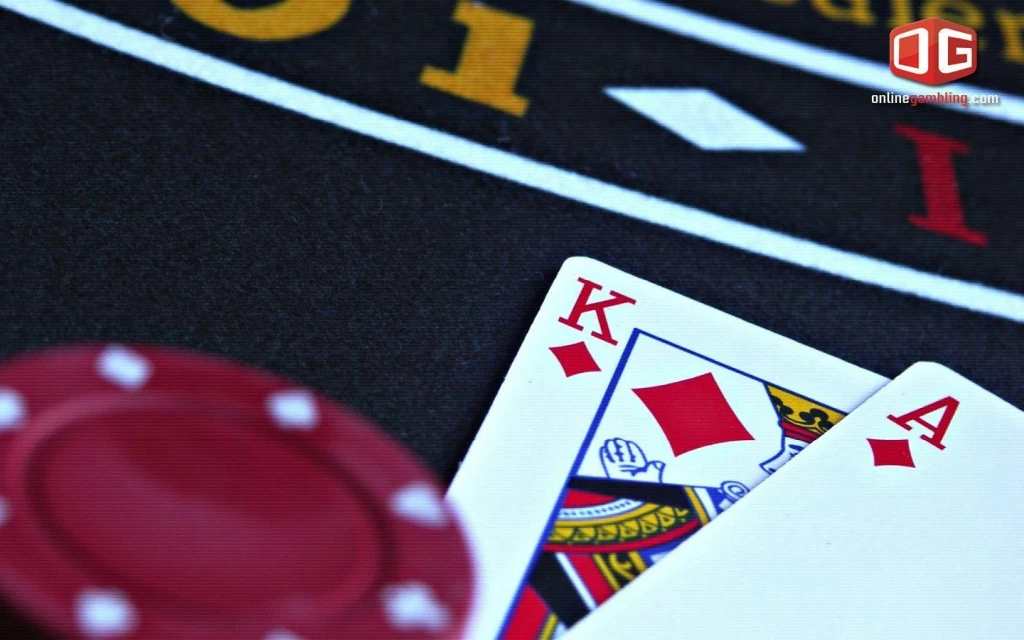
Quick Guide on When to Split in Blackjack
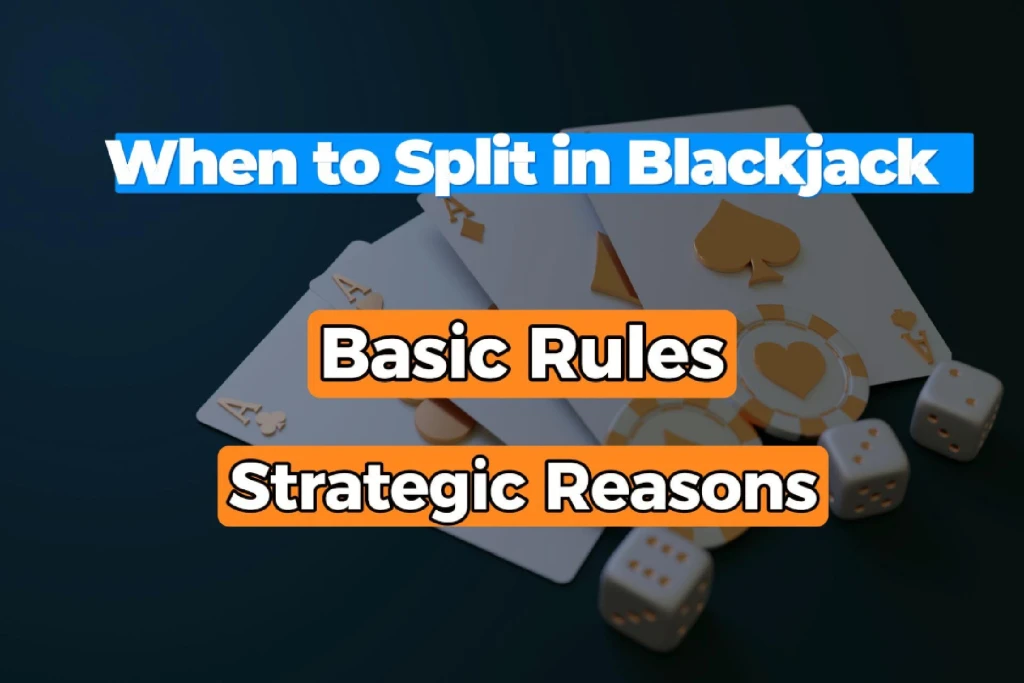
What’s Splitting in Blackjack?
Splitting is a powerful move in blackjack that kicks in when you’re dealt two cards of the same value, such as pairs of aces or eights. This power move can turn crummy hands into powerful double plays that can actually challenge the dealer.
- You can split your hand only if your initial two cards are a pair, like two 8s or two Aces.
- If you want to split, simply place another bet equal to your initial wager and play your two hands simultaneously.
- When you split, you double the potential to win if both new hands overcome the dealer’s.
Some of the more obvious scenarios to splits are when you get a pair of Aces or Eights, here’s why:
Aces: Splitting aces is almost always a good idea. Each ace begins a new hand with great potential, aiming for a perfect 21.
Eights: A pair of eights sums to 16—a tricky number to play because it’s close to 21 but highly risky. Splitting them not only avoids that weak 16, but also allows you to build new, stronger hands.
You can also choose to split other uncomfortable, weak hands. Typically, blackjack pays out at a 1:1 ratio for each winning hand. This means that for every hand that beats the dealer, you win an amount equal to your bet on that hand.
Knowing when to split in Blackjack will substantially boost your winnings over time, and it’s one of those skills that you’ll want to start practicing early on if you’re a beginner. Once you’ve mastered these initial scenarios, you can move on to more nuanced splits to take your game to the next level.
Mastering When to Split in Blackjack
Insurance bets are safety nets when the dealer shows that nasty Ace on the upcard:
- You make an insurance bet if you think the dealer will pull a blackjack with that ace.
Payout details: The typical payout for this bet is 2:1. It’s a tempting sidebet to make, because an Ace in the upcard makes it likely that the dealer will hit 21.
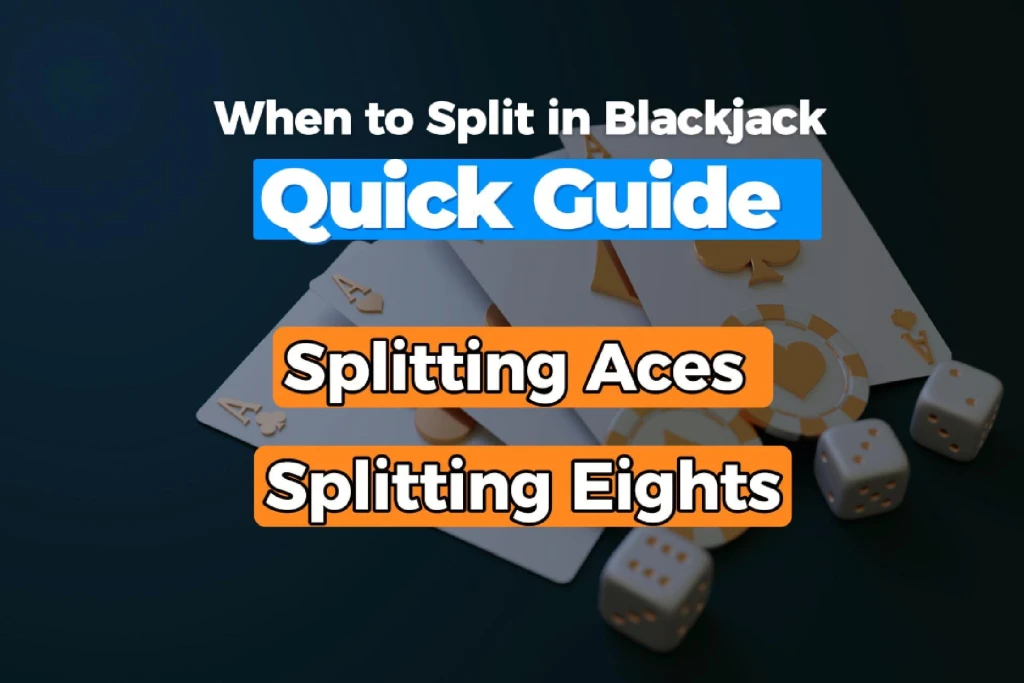
When Not to Split in Blackjack
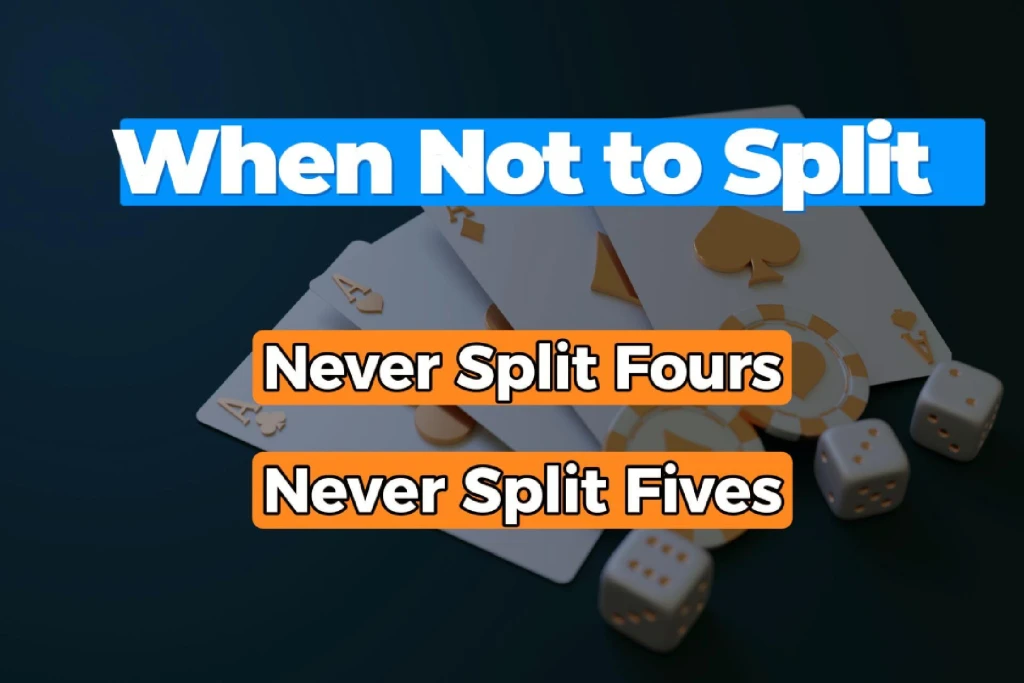
Why You Should Keep Your 10s Together in Blackjack
Let’s do a quick simulation, and prove why splitting 10s is generally a bad idea. Two phrases come to my mind related to this matter: 1) “if it ain’t broke, don’t fix”, 2) “don’t snatch defeat from the jaws of victory”.
The Action Starts
You’re at the blackjack table, and you’re dealt two 10s for a total of 20. This is an almost unbeatable combo, especially when you see the dealer’s upcard: a 6. But, let’s say you get greedy and decide to split.
Decision to Split
You opt to split your 10s, placing an additional bet for the new hand you’re forming.
The Mistake
- First Hand: You draw a 6, landing you a total of 16. Now you’re in a dilemma: standing is weak, and hitting could easily bust you. Not good.
- Second Hand: A 5 comes up, making this hand 15. It’s another tough spot similar to the first hand. You could bust, or stand on a weak score.
But none of that matters. You only get an extra card. You’re stuck with this.
Dealer’s Turn
The dealer flips a 10 for a total of 16. They hit according to the rules and draw a 4, pushing their total to 20.
Final Comparison
Your First Hand (16) and Second Hand (15): Both fall short of the dealer’s 20. You lost both of your wagers. If you had stuck to your guns and calmed your greed, you would’ve won against the dealer’s 20, or, at the worst case tied.
In this scenario, splitting the 10s converted what was almost certainly a winning or tying hand into two weaker hands that lost to the dealer’s 20. This is why you don’t split 10s, you basically open yourself up to being beaten twice.
FAQs on When to Split in Blackjack
What does it mean to split in blackjack?
To split in blackjack means if you are dealt a pair (two cards of the same rank) as your first two cards, you have the option to split them into two separate hands. You then place another bet of the same amount as the first, and each card is played as the start of a new hand .
When should you always split in blackjack?
You should always split aces and eights. Splitting aces gives you a better chance of hitting 21, and splitting eights can turn a likely losing hand into a chance of winning, as 16 is a poor hand to start with .
Are there times you should never split in blackjack?
Yes, you should generally never split tens or face cards. Holding a 20 is a very strong hand, and splitting could lead to less favorable hands .
Does the dealer’s up card affect when I should split?
Yes, the dealer’s up card can significantly influence your decision to split. For example, you might split 2s or 3s only when the dealer’s card is between 2 and 7. The strategy varies depending on the dealer’s up card, as it affects the likelihood of the dealer busting or building a strong hand .
How does splitting affect my odds of winning?
Splitting can either increase or decrease your odds of winning depending on when and what you split. Properly timed splits can maximize your potential return, particularly with aces and eights. Conversely, poor splitting decisions, like splitting tens, generally decrease your odds of winning
Blackjack is a deceptively simple game. In fact, most beginners and just think of it as a game of chance, reserved for those blessed with tremendous luck. They’re unaware of the layers of strategy, skills and lightning-speed calculations that veterans use to succeed and thrive in both real life and online casinos.
One of these skills is knowing when to split in Blackjack.

Quick Guide on When to Split in Blackjack

What’s Splitting in Blackjack?
Splitting is a powerful move in blackjack that kicks in when you’re dealt two cards of the same value, such as pairs of aces or eights. This power move can turn crummy hands into powerful double plays that can actually challenge the dealer.
- You can split your hand only if your initial two cards are a pair, like two 8s or two Aces.
- If you want to split, simply place another bet equal to your initial wager and play your two hands simultaneously.
- When you split, you double the potential to win if both new hands overcome the dealer’s.
Some of the more obvious scenarios to splits are when you get a pair of Aces or Eights, here’s why:
Aces: Splitting aces is almost always a good idea. Each ace begins a new hand with great potential, aiming for a perfect 21.
Eights: A pair of eights sums to 16—a tricky number to play because it’s close to 21 but highly risky. Splitting them not only avoids that weak 16, but also allows you to build new, stronger hands.
You can also choose to split other uncomfortable, weak hands. Typically, blackjack pays out at a 1:1 ratio for each winning hand. This means that for every hand that beats the dealer, you win an amount equal to your bet on that hand.
Knowing when to split in Blackjack will substantially boost your winnings over time, and it’s one of those skills that you’ll want to start practicing early on if you’re a beginner. Once you’ve mastered these initial scenarios, you can move on to more nuanced splits to take your game to the next level.
Mastering When to Split in Blackjack
Insurance bets are safety nets when the dealer shows that nasty Ace on the upcard:
- You make an insurance bet if you think the dealer will pull a blackjack with that ace.
Payout details: The typical payout for this bet is 2:1. It’s a tempting sidebet to make, because an Ace in the upcard makes it likely that the dealer will hit 21.

When Not to Split in Blackjack

Why You Should Keep Your 10s Together in Blackjack
Let’s do a quick simulation, and prove why splitting 10s is generally a bad idea. Two phrases come to my mind related to this matter: 1) “if it ain’t broke, don’t fix”, 2) “don’t snatch defeat from the jaws of victory”.
The Action Starts
You’re at the blackjack table, and you’re dealt two 10s for a total of 20. This is an almost unbeatable combo, especially when you see the dealer’s upcard: a 6. But, let’s say you get greedy and decide to split.
Decision to Split
You opt to split your 10s, placing an additional bet for the new hand you’re forming.
The Mistake
- First Hand: You draw a 6, landing you a total of 16. Now you’re in a dilemma: standing is weak, and hitting could easily bust you. Not good.
- Second Hand: A 5 comes up, making this hand 15. It’s another tough spot similar to the first hand. You could bust, or stand on a weak score.
But none of that matters. You only get an extra card. You’re stuck with this.
Dealer’s Turn
The dealer flips a 10 for a total of 16. They hit according to the rules and draw a 4, pushing their total to 20.
Final Comparison
Your First Hand (16) and Second Hand (15): Both fall short of the dealer’s 20. You lost both of your wagers. If you had stuck to your guns and calmed your greed, you would’ve won against the dealer’s 20, or, at the worst case tied.
In this scenario, splitting the 10s converted what was almost certainly a winning or tying hand into two weaker hands that lost to the dealer’s 20. This is why you don’t split 10s, you basically open yourself up to being beaten twice.
FAQs on When to Split in Blackjack
What does it mean to split in blackjack?
To split in blackjack means if you are dealt a pair (two cards of the same rank) as your first two cards, you have the option to split them into two separate hands. You then place another bet of the same amount as the first, and each card is played as the start of a new hand .
When should you always split in blackjack?
You should always split aces and eights. Splitting aces gives you a better chance of hitting 21, and splitting eights can turn a likely losing hand into a chance of winning, as 16 is a poor hand to start with .
Are there times you should never split in blackjack?
Yes, you should generally never split tens or face cards. Holding a 20 is a very strong hand, and splitting could lead to less favorable hands .
Does the dealer’s up card affect when I should split?
Yes, the dealer’s up card can significantly influence your decision to split. For example, you might split 2s or 3s only when the dealer’s card is between 2 and 7. The strategy varies depending on the dealer’s up card, as it affects the likelihood of the dealer busting or building a strong hand .
How does splitting affect my odds of winning?
Splitting can either increase or decrease your odds of winning depending on when and what you split. Properly timed splits can maximize your potential return, particularly with aces and eights. Conversely, poor splitting decisions, like splitting tens, generally decrease your odds of winning
Blackjack is a deceptively simple game. In fact, most beginners and just think of it as a game of chance, reserved for those blessed with tremendous luck. They’re unaware of the layers of strategy, skills and lightning-speed calculations that veterans use to succeed and thrive in both real life and online casinos.
One of these skills is knowing when to split in Blackjack.

Quick Guide on When to Split in Blackjack

What’s Splitting in Blackjack?
Splitting is a powerful move in blackjack that kicks in when you’re dealt two cards of the same value, such as pairs of aces or eights. This power move can turn crummy hands into powerful double plays that can actually challenge the dealer.
- You can split your hand only if your initial two cards are a pair, like two 8s or two Aces.
- If you want to split, simply place another bet equal to your initial wager and play your two hands simultaneously.
- When you split, you double the potential to win if both new hands overcome the dealer’s.
Some of the more obvious scenarios to splits are when you get a pair of Aces or Eights, here’s why:
Aces: Splitting aces is almost always a good idea. Each ace begins a new hand with great potential, aiming for a perfect 21.
Eights: A pair of eights sums to 16—a tricky number to play because it’s close to 21 but highly risky. Splitting them not only avoids that weak 16, but also allows you to build new, stronger hands.
You can also choose to split other uncomfortable, weak hands. Typically, blackjack pays out at a 1:1 ratio for each winning hand. This means that for every hand that beats the dealer, you win an amount equal to your bet on that hand.
Knowing when to split in Blackjack will substantially boost your winnings over time, and it’s one of those skills that you’ll want to start practicing early on if you’re a beginner. Once you’ve mastered these initial scenarios, you can move on to more nuanced splits to take your game to the next level.
Mastering When to Split in Blackjack
Insurance bets are safety nets when the dealer shows that nasty Ace on the upcard:
- You make an insurance bet if you think the dealer will pull a blackjack with that ace.
Payout details: The typical payout for this bet is 2:1. It’s a tempting sidebet to make, because an Ace in the upcard makes it likely that the dealer will hit 21.

When Not to Split in Blackjack

Why You Should Keep Your 10s Together in Blackjack
Let’s do a quick simulation, and prove why splitting 10s is generally a bad idea. Two phrases come to my mind related to this matter: 1) “if it ain’t broke, don’t fix”, 2) “don’t snatch defeat from the jaws of victory”.
The Action Starts
You’re at the blackjack table, and you’re dealt two 10s for a total of 20. This is an almost unbeatable combo, especially when you see the dealer’s upcard: a 6. But, let’s say you get greedy and decide to split.
Decision to Split
You opt to split your 10s, placing an additional bet for the new hand you’re forming.
The Mistake
- First Hand: You draw a 6, landing you a total of 16. Now you’re in a dilemma: standing is weak, and hitting could easily bust you. Not good.
- Second Hand: A 5 comes up, making this hand 15. It’s another tough spot similar to the first hand. You could bust, or stand on a weak score.
But none of that matters. You only get an extra card. You’re stuck with this.
Dealer’s Turn
The dealer flips a 10 for a total of 16. They hit according to the rules and draw a 4, pushing their total to 20.
Final Comparison
Your First Hand (16) and Second Hand (15): Both fall short of the dealer’s 20. You lost both of your wagers. If you had stuck to your guns and calmed your greed, you would’ve won against the dealer’s 20, or, at the worst case tied.
In this scenario, splitting the 10s converted what was almost certainly a winning or tying hand into two weaker hands that lost to the dealer’s 20. This is why you don’t split 10s, you basically open yourself up to being beaten twice.
FAQs on When to Split in Blackjack
What does it mean to split in blackjack?
To split in blackjack means if you are dealt a pair (two cards of the same rank) as your first two cards, you have the option to split them into two separate hands. You then place another bet of the same amount as the first, and each card is played as the start of a new hand .
When should you always split in blackjack?
You should always split aces and eights. Splitting aces gives you a better chance of hitting 21, and splitting eights can turn a likely losing hand into a chance of winning, as 16 is a poor hand to start with .
Are there times you should never split in blackjack?
Yes, you should generally never split tens or face cards. Holding a 20 is a very strong hand, and splitting could lead to less favorable hands .
Does the dealer’s up card affect when I should split?
Yes, the dealer’s up card can significantly influence your decision to split. For example, you might split 2s or 3s only when the dealer’s card is between 2 and 7. The strategy varies depending on the dealer’s up card, as it affects the likelihood of the dealer busting or building a strong hand .
How does splitting affect my odds of winning?
Splitting can either increase or decrease your odds of winning depending on when and what you split. Properly timed splits can maximize your potential return, particularly with aces and eights. Conversely, poor splitting decisions, like splitting tens, generally decrease your odds of winning
Blackjack is a deceptively simple game. In fact, most beginners and just think of it as a game of chance, reserved for those blessed with tremendous luck. They’re unaware of the layers of strategy, skills and lightning-speed calculations that veterans use to succeed and thrive in both real life and online casinos.
One of these skills is knowing when to split in Blackjack.

Quick Guide on When to Split in Blackjack

What’s Splitting in Blackjack?
Splitting is a powerful move in blackjack that kicks in when you’re dealt two cards of the same value, such as pairs of aces or eights. This power move can turn crummy hands into powerful double plays that can actually challenge the dealer.
- You can split your hand only if your initial two cards are a pair, like two 8s or two Aces.
- If you want to split, simply place another bet equal to your initial wager and play your two hands simultaneously.
- When you split, you double the potential to win if both new hands overcome the dealer’s.
Some of the more obvious scenarios to splits are when you get a pair of Aces or Eights, here’s why:
Aces: Splitting aces is almost always a good idea. Each ace begins a new hand with great potential, aiming for a perfect 21.
Eights: A pair of eights sums to 16—a tricky number to play because it’s close to 21 but highly risky. Splitting them not only avoids that weak 16, but also allows you to build new, stronger hands.
You can also choose to split other uncomfortable, weak hands. Typically, blackjack pays out at a 1:1 ratio for each winning hand. This means that for every hand that beats the dealer, you win an amount equal to your bet on that hand.
Knowing when to split in Blackjack will substantially boost your winnings over time, and it’s one of those skills that you’ll want to start practicing early on if you’re a beginner. Once you’ve mastered these initial scenarios, you can move on to more nuanced splits to take your game to the next level.
Mastering When to Split in Blackjack
Insurance bets are safety nets when the dealer shows that nasty Ace on the upcard:
- You make an insurance bet if you think the dealer will pull a blackjack with that ace.
Payout details: The typical payout for this bet is 2:1. It’s a tempting sidebet to make, because an Ace in the upcard makes it likely that the dealer will hit 21.

When Not to Split in Blackjack

Why You Should Keep Your 10s Together in Blackjack
Let’s do a quick simulation, and prove why splitting 10s is generally a bad idea. Two phrases come to my mind related to this matter: 1) “if it ain’t broke, don’t fix”, 2) “don’t snatch defeat from the jaws of victory”.
The Action Starts
You’re at the blackjack table, and you’re dealt two 10s for a total of 20. This is an almost unbeatable combo, especially when you see the dealer’s upcard: a 6. But, let’s say you get greedy and decide to split.
Decision to Split
You opt to split your 10s, placing an additional bet for the new hand you’re forming.
The Mistake
- First Hand: You draw a 6, landing you a total of 16. Now you’re in a dilemma: standing is weak, and hitting could easily bust you. Not good.
- Second Hand: A 5 comes up, making this hand 15. It’s another tough spot similar to the first hand. You could bust, or stand on a weak score.
But none of that matters. You only get an extra card. You’re stuck with this.
Dealer’s Turn
The dealer flips a 10 for a total of 16. They hit according to the rules and draw a 4, pushing their total to 20.
Final Comparison
Your First Hand (16) and Second Hand (15): Both fall short of the dealer’s 20. You lost both of your wagers. If you had stuck to your guns and calmed your greed, you would’ve won against the dealer’s 20, or, at the worst case tied.
In this scenario, splitting the 10s converted what was almost certainly a winning or tying hand into two weaker hands that lost to the dealer’s 20. This is why you don’t split 10s, you basically open yourself up to being beaten twice.
FAQs on When to Split in Blackjack
What does it mean to split in blackjack?
To split in blackjack means if you are dealt a pair (two cards of the same rank) as your first two cards, you have the option to split them into two separate hands. You then place another bet of the same amount as the first, and each card is played as the start of a new hand .
When should you always split in blackjack?
You should always split aces and eights. Splitting aces gives you a better chance of hitting 21, and splitting eights can turn a likely losing hand into a chance of winning, as 16 is a poor hand to start with .
Are there times you should never split in blackjack?
Yes, you should generally never split tens or face cards. Holding a 20 is a very strong hand, and splitting could lead to less favorable hands .
Does the dealer’s up card affect when I should split?
Yes, the dealer’s up card can significantly influence your decision to split. For example, you might split 2s or 3s only when the dealer’s card is between 2 and 7. The strategy varies depending on the dealer’s up card, as it affects the likelihood of the dealer busting or building a strong hand .
How does splitting affect my odds of winning?
Splitting can either increase or decrease your odds of winning depending on when and what you split. Properly timed splits can maximize your potential return, particularly with aces and eights. Conversely, poor splitting decisions, like splitting tens, generally decrease your odds of winning



